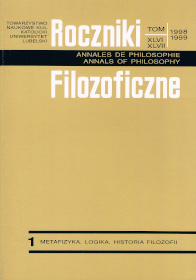Próba reinterpretacji (neo)tomistycznej koncepcji sądu egzystencjalnego
Abstrakt
The article seeks to reinterpret the (neo)Thomistic conception of existential judgment (introduced to Thomism by E. Gilson) in terms of semiotics (especially in terms of pragmatics).
By „existential judgment” the author means a three-phase (pre)cognitive process composed of:
(1) a passive receiving of sensations (sense-data) as the result of the activity of an existing thing;
(2) an act of assertion (affirmation) of its existence;
(3) an expression (locution) of the existential sentence: „This thing exists”.
In this process the central place is occupied by (2), which is described by nine features. In the light of these features the existential judgment (or existential presupposition) seems to be the (pre)condition of all knowledge and all communication. Contrary to many contemporary philosophers and linguists, Thomists believe that the essence of existential judgment lies not in the reference of the indexical expressions (like „this”) to objects, but in the pre-linguistic affirmation of existence, expressed by the verb „to be” or „to exist”.
Copyright (c) 1999 Roczniki Filozoficzne

Utwór dostępny jest na licencji Creative Commons Uznanie autorstwa – Użycie niekomercyjne – Bez utworów zależnych 4.0 Międzynarodowe.





